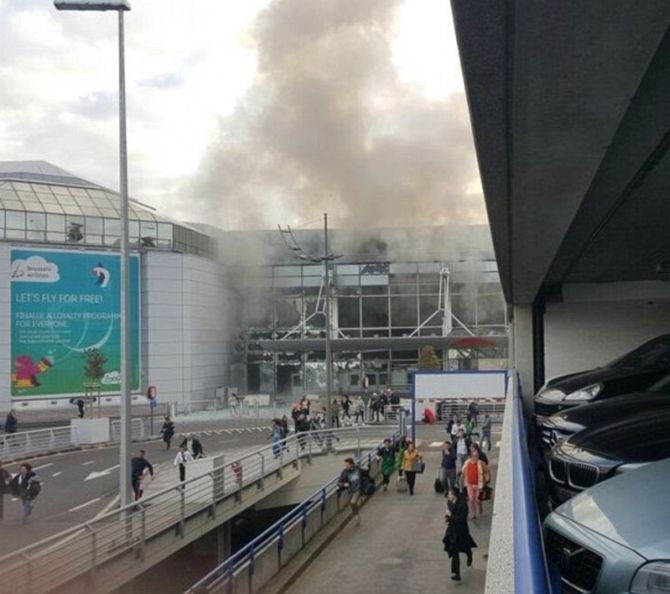'Increasingly, there is a tendency to magnify 'victimhood' of the minority for electoral gains and vote bank politics.'
'There is no doubt that there is a worldwide rise in Islamophobia. There is a tendency amongst some in India to react to this in the Indian milieu,' says Colonel Anil A Athale(retd).

The attacks in Brussels had an echo in India that is long used to bomb blasts and terror attacks. Many half-baked 'experts' have warned against the threat of ISIS or Daesh to India. The comparison of the two situations -- Europe and India -- are very superficial and even misleading. While we must indeed remain vigilant, this extrapolation of the situation in Europe on India is farfetched. To understand the similarities and differences read on!
One major point common to the Brussels attacks and the earlier carnage in Paris is that in both cases the terrorists who carried out the attacks were 'home grown.' In contrast, the Mumbai attacks in 2008, very similar to one in Paris, was planned and executed by external elements (in this case Pakistan's ISI and Lashkar-e-Tayiba) with some local support.
Terrorism or insurgency can only thrive if there is external support and safe areas/sanctuaries are available. In the case of Europe, most cities have Muslim majority ghettos that are virtual no go areas for the police. The State does not have any idea or control over what is going on in these areas.
In Daesh or ISIS, there is the external source of support. But most importantly in Europe, the Muslim minority has failed to integrate in the host societies. Muslim separatism is at the root of Europe's woes.
The importance of Ghettoisation was brought home to me starkly in erstwhile South Africa. During the apartheid regime, the South African racist government followed created Bantustans, separate Black enclaves. This policy played directly into the hands of the African National Congress that carried out a successful campaign of bombings and sabotage in the 1970s and 1980s.
uMkhonto weSizwe -- The Spear of the Nation -- carried out successful attacks on economic targets in South Africa. The Black ghettos in urban areas served as bases for these attacks. The situation in Europe is similar to South Africa of the 1980s.
India has had its share of urban ghettos being used as terrorist bases. In 2006, after the Mumbai train blasts of 7/11, a terror cell in the Kondhwa area of Pune was busted by the police. It later came to light that the terrorists even had a mini-firing range in the area. Many Indian cities have similar ghettos that are no go areas for the police and the State is unaware of goings on there.
After the ethnic cleansing of Kashmiri Pandits in January 1990, the Kashmir valley has come to resemble a vast ghetto. It is no wonder that violent activities and sabotage are unstoppable in that area.
The saving grace for India has been (so far) its villages. The ghettoisation witnessed in the urban areas is unknown in the countryside where different communities live peacefully side by side. Of late, this rural peace has certainly come under stress due to the beef ban controversy in some parts of the country. By and large and in contrast to the urban areas, the rural countryside has been free from the virus of extremism so far.
Ghettoisation, besides physical aspects, also has a mental dimension. In Europe, the minority Muslims are racially and culturally separate from the mainstream. Whereas in India, the Muslim minority is not only an inseparable part of the cultural scene, but are in a dominant position in the movie industry. The dominance of the minority in the cultural sphere has some interesting effects abroad.
While visiting South East Asia, in many places in Thailand, Vietnam and Indonesia, on being told that I was from India, the questioner assumed me to be a Muslim. Names like Shah Rukh Khan are well known even in the remotest parts of South East Asia and are naturally linked to India and its image.
The Muslim minority is dominant not only in pop art, but also is the mainstay of classical cultural traditions in dance and music. This kind of cultural unity is not seen in the European context. In fact, the Muslim minority in Europe is culturally alienated from the majority Europeans. There may be some exceptions in sports, but the exceptions only prove a rule.
In India, increasingly, the minorities participate in the media and many have reached top positions. In addition, among the industrial elite, there are many from the minority like Azim Premji, Khorakiwalla etc. One is hard put to find similar examples from Europe.
All in all, while the ghettoisation of the minorities in urban areas is common to both Europe and India, in our case, many factors mitigate its effect. It is therefore no surprise that for many years Al Qaeda failed to find recruits in India. Like Al Qaeda, ISIS is also unlikely to succeed in India.
Does that mean we are immune to this virus? A resounding answer is no, we are not immune. The increasing tendency to emphasise a separate identity in India is a worrying aspect. It is appalling to see Muslim parents imposing skull caps and abhayas on even small children in some areas.
Increasingly, there is a tendency to magnify 'victimhood' of the minority for electoral gains and vote bank politics. There is no doubt that there is a worldwide rise in Islamophobia, particularly in Europe and the US. There is a tendency amongst some in India to react to this in the Indian milieu.
We must guard against these two factors that can give rise to ISIS clones in India. But for now, India is NOT Europe!
Colonel Anil A Athale (retd) is a military historian and student of insurgency and terrorism.












 © 2025
© 2025